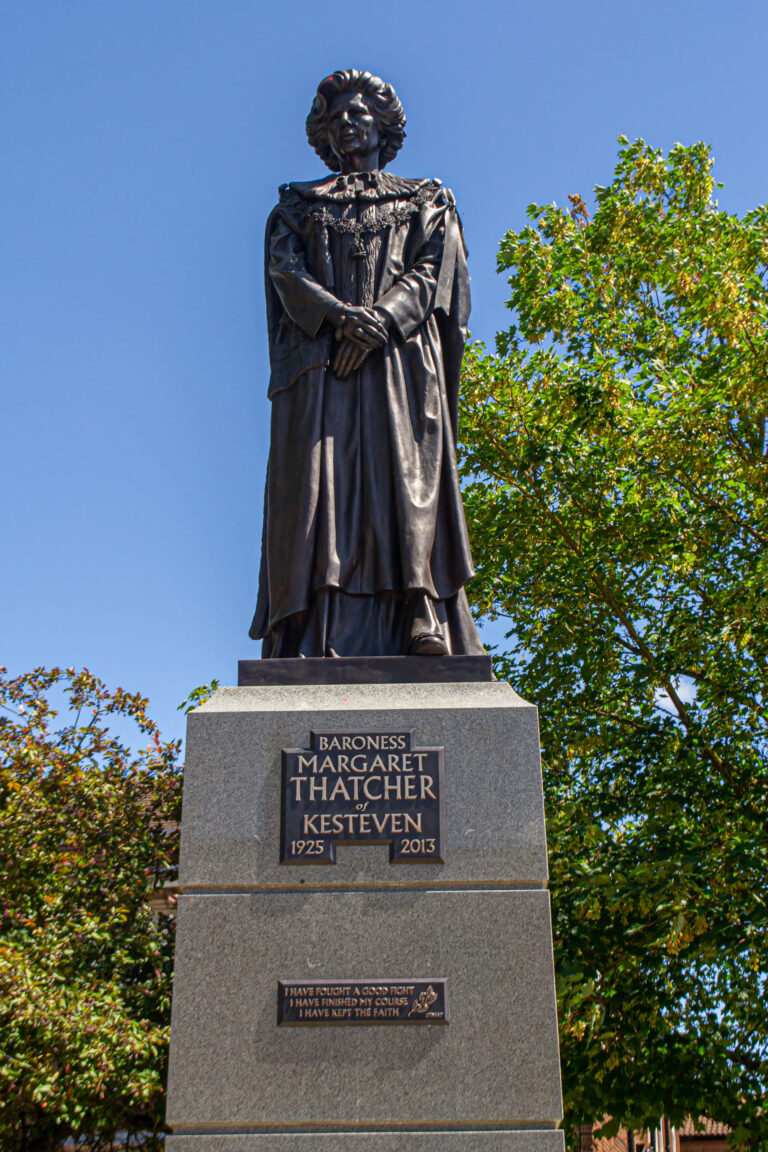
Retail expert, broadcaster, and straight-talking business consultant Clare Bailey better known as The Retail Champion doesn’t do nostalgia for nostalgia’s sake. Born and educated in Lincolnshire, she’s seen how small-town ambition once shaped national success stories and how, somewhere along the way, parts of Britain lost that spark.
Ahead of speaking at the festival celebrating Margaret Thatcher’s centenary, Clare reflects on ambition, local business, and what the Iron Lady’s legacy might mean for today’s Britain. Expect insight, empathy, and unapologetic honesty because Clare calls things as they are, not as we wish them to be.

- Why did you decide to get involved in the festival? Is it just the local connection or do you find her personally inspiring?
Any woman who remembers anything about Margaret Thatcher will find her inspiring.
We both went to Lincolnshire grammar schools, she went to Oxford University, I aimed for Cambridge. She made it; I didn’t quite make that, and ended up at Imperial College London (but still doing Chemistry!) But she showed me it was possible. She made it acceptable to be ambitious, intelligent, and unapologetically driven and that mattered.
She lived above a shop; I grew up surrounded by family in retail, hospitality, and manufacturing. Her story made me believe that being from a small town didn’t mean thinking small. For girls growing up in the 80s, that was revolutionary.
So yes, there’s a local connection, but it’s also deeply personal. She gave women like me permission to take up space and be ambitious without apology.
- Do you think Grantham, or more broadly Lincolnshire, is still a place where “ordinary people can dare to think big”?
Lincolnshire is full of good, hard-working people but opportunity hasn’t always kept pace with effort.
There’s talent everywhere, but too often it’s untapped. Farming, manufacturing and service industries dominate, and while they’re vital, they shouldn’t define our limits. The grammar schools do their bit, but for many, ambition feels like a luxury they can’t afford.
We need to rebuild belief and provide opportunity. Ambition isn’t arrogance, it’s fuel. The challenge isn’t that Lincolnshire lacks talent or drive; it’s that it’s been talked down for too long. People stop dreaming when they stop believing anything will change.
- What’s the business community like in this part of Britain? What are the challenges and how can they be solved?
Resilient, but weary.
Costs are up, skills are down, and too many business owners are simply exhausted. There’s incredible potential here but the ecosystem needs rebuilding. Collaboration, local investment, apprenticeships, and hands-on mentoring are what’s missing.
And we must stop offering one-size-fits-all “social media 101” workshops. Businesses need bespoke support from people who’ve lived it, not just lectured on it. When we combine experience, empathy, and expertise, that’s when things change.
We also need to address the “brain drain.” The brightest students head to university and don’t return. Until there are more reasons and more pride to stay, the cycle will continue.
- Do you think Grantham and more broadly Britain is still a place where resilience, hard work and ambition are rewarded?
It can be, but we need to rediscover what that really means.
Back in Thatcher’s day, Britain was economically and socially fractured. Government inherited chaos; industrial unrest, high inflation, low confidence. It was always going to be divisive for anyone who tried to change it, but change was necessary.
I still remember having a pen friend in Port Stanley during the Falklands conflict. Seeing someone on the BBC recently say, “The reason I’m British today is because of that woman who fought for us,” was a reminder that leadership, however controversial, can leave lasting pride.
Let’s not forget what Thatcher got right: lowering taxation to unleash enterprise, backing those who worked hard, and giving people a sense of ownership in their success. The Laffer Effect is a real economic principle, push taxes too high and people stop trying. She understood that.
We could use a dose of that spirit today: reward effort, not evasion; celebrate aspiration, not penalise it.
- What do you think Thatcher would make of Grantham today?
I think she’d see both the frustration and the opportunity.
Grantham has so much untapped potential. It’s evolved into a commuter town, yes, but it’s still brimming with character and capability. What’s missing isn’t talent, it’s belief and boldness.
For a town that educated both Isaac Newton and Margaret Thatcher, there’s no shortage of legacy to build upon. But we don’t celebrate it nearly enough. Thatcher wouldn’t accept that, she’d roll up her sleeves and demand better. Cleaner streets, fuller shops, bigger ideas.
She’d remind us that “You may have to fight a battle more than once to win it,” and that applies as much to towns as it does to people.
Grantham doesn’t need to cling to the past. It needs to learn from it.
Closing Thoughts
Clare Bailey isn’t one for comfortable conversations but she speaks with compassion, clarity, and conviction.
Her message for Lincolnshire and Britain is simple: stop apologising for ambition. Start rewarding it. Because resilience and hard work are already here, what’s missing is belief, opportunity, and leadership that understands both.
Or as Thatcher herself said: “Look at a day when you are supremely satisfied at the end. It’s not a day when you lounge about doing nothing. It’s a day you’ve had everything to do and you’ve done it.”
About Clare Bailey

Clare Bailey, aka The Retail Champion, is one of the UK’s most respected retail experts, broadcasters, and consultants. A straight-talking voice for the high street, she’s spent over 30 years working with everyone from independents to global brands, helping businesses sharpen strategy, adapt to change, and grow profitably.
Author of The Retail Champion: 10 Steps to Retail Success and How to Sell to Retail, she’s a regular on BBC, Sky News, and LBC, and hosts The Retail Reckoning Podcast, where she and her guests tackle the real issues shaping retail today.
When she’s not consulting or speaking, you’ll find her fuelled by strong coffee, curiosity, and a firm belief that British business still has plenty to be proud of.


